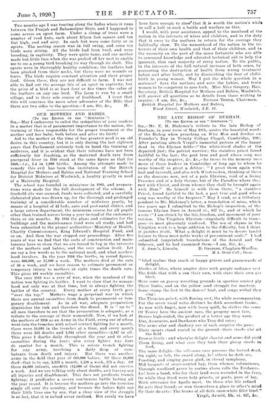THE LATE BISHOP OF DURHAM.
(To THE EDITOR OT THE " SPECTATOR.") SIR,—Mr. E. It. Blakeney's tribute to the late Bishop of Durham, in your issue of May 29th, quotes the beautiful word' of -the Bishop when preaching on Wise Men and Scribes on Founder's Day in Trinity College Chapel, Cambridge, 1907. After painting afresh Virgil's immortal picture of the happy dead in the Elysian fields—" the white-tired shades of the departed just; the patriot warrior; the stainless priest found faithful to the last; the poet true and good whose song was worthy of the inspirer, &e. &c.,—he turns to the memory once more of those leaders in Cambridge of long ago to whom he owns himself so great a debtor : " I greet them again with hail and farewell, and also with Wicdersehen, thinking of tilers as the denizens now, not of a pale Elysian', void of a living Presence and of a holy throne, but of the Paradise where the/ rest with Christ, and from whence they shall be brought again with Him." He himself is with them there, "a stainless Priest, found faithful to the last, a poet true and good whose song was worthy of the Inspirer." May I send, as a tributary pendant to Mr. Blakeney's letter, a translation of mine, which two years ago I submitted to the Bishop's inspection, of the famous Elysian lines in Aeneid vi., 637 fo., and of which he
w rote :" I am struck by the life,freedom, and movement of your version. The Virgilian Elysium—singularly difficult to trans- pose—is most pleasingly rendered. The use of rhyme in the Virgilian work is a large addition to the difficulty, but I think it justifies itself. What a delight it must be to devote lawful leisure to these most noble works of pre-eminent souls." I had submitted (unprinted) translations of the Aeneid and the Odyssey, and he had examined them.—I am, Sir, &c.,
S. Anne's, Lincoln. D. GRAHAME, Chaplain-War den.
M.A. Oriel Coll., Oxon.
" Glad realms they reach of happy groves and greenswards of delight-,
Abodes of bliss, where ampler skies with purple radiance vest The fields that with a sun their own, with stars their own are blest.
Here some on grassy wrestling grounds in sportive contest ply Their limbs, and on the yellow sand struggle for mastery. Some stamp the feet to the dances' beat, and songs withal they
sing: The Thracian priest, with flowing vest, the while accompanying. For the seven vocal notes distinct ho dot's accordant frame, As now with finger, now with ivory quill, he strikes the same. Of Teucer here the ancient race, the progeny most fair, Heroes high-souled, the product of a better age they were. Ilus, Assaracus, and Dardanus who Troy did raise; The arms afar and shadowy car of each surprise the gaze; Their spears stand rooted in the ground—their steeds o'er all the field Browse freely : and whate'er delight chariot and arms did yield Them living, and what care they took their glossy steeds to feed, Time same delight—the self-same care pursues the buried stead. On right, or left, the sward along, lo! others he cloth see, Feasting, and singing paean glad, in choral symphony, Mid bosquets of sweet-scented bay, from whence, voluminous, Through woodland grove to realms above rolls the Eridanus. Lo! here a band, who for their land were wounded in the fray, Or while they lived were holy priests, or poets, pure of lay, With utterance for Apollo meet. Or those who life refined By arts they found; or won themselves a place in other's mind By their deserts: The brows of all cloth snow-white fillet bind."
Virgil, Ae-ieid, Bk. yi. 637, &c.


































 Previous page
Previous page